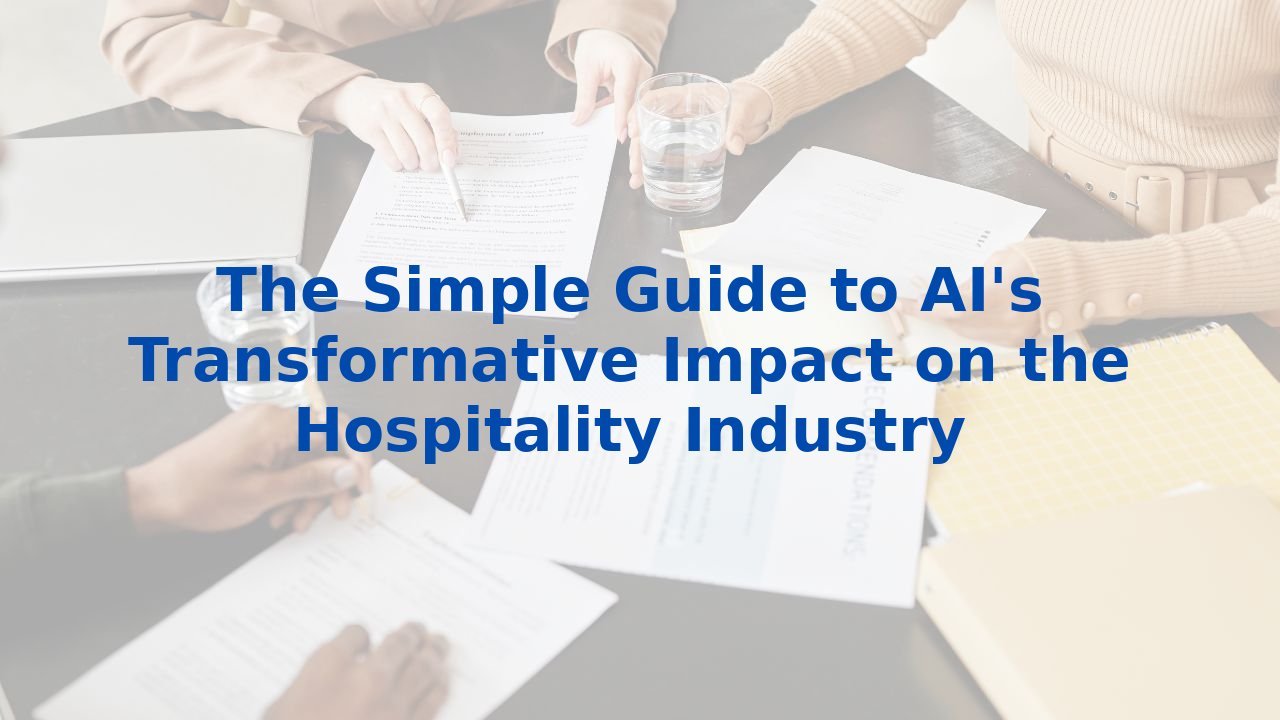The Simple Guide to AI's Transformative Impact on the Hospitality Industry
The Simple Guide to AI's Transformative Impact on the Hospitality Industry
The hospitality industry is witnessing an unprecedented revolution driven by Artificial Intelligence (AI). As businesses strive to enhance efficiency and elevate guest experiences, AI stands at the forefront, offering innovative solutions across operations, marketing, and customer service. This guide delves into the various applications of AI, highlighting its transformative impact on the hospitality sector.
Enhancing Customer Experience
One of the most significant contributions of AI in hospitality is the enhancement of the customer experience. Here are some key applications:
- Intelligent Assistance and Communication: AI-powered chatbots and virtual assistants are transforming how hotels interact with guests. Available 24/7, these tools assure instant responses to inquiries, reducing the need for human intervention and ensuring prompt assistance at any hour.
- Personalization: By analyzing vast data sets, AI can create detailed guest profiles, recognizing individual preferences, behaviors, and previous interactions. This capability allows hotels to provide tailored recommendations—from dining options to local attractions—resulting in a uniquely personalized stay.
- Feedback Analysis: AI tools are increasingly being used to collect and analyze guest feedback, leading to innovative experiences. For instance, AI-driven interactive displays can respond to guest movements, creating a dynamic and engaging environment that enhances overall satisfaction.
Streamlining Operations
AI does not stop at customer experience—it actively streamlines operations, making hotels run more efficiently:
- Inventory Management: AI systems optimize inventory by predicting supply needs, markedly reducing waste and improving operational effectiveness. This ensures that hotels have the necessary resources exactly when they need them.
- Energy Management: Energy consumption is paramount for any hospitality operation. AI helps monitor and control usage, leading to reduced operational costs and a smaller environmental footprint.
- Housekeeping Schedules: With AI, scheduling and management of housekeeping tasks have become efficient. This not only boosts guest satisfaction due to timely room availabilities but also reduces labor costs significantly.
Smart Marketing and Revenue Management
The advent of AI is also transforming marketing and revenue management in the hospitality sector:
- Dynamic Pricing Strategies: Real-time adjustments to room rates based on market conditions ensure that hotels can maximize revenues. AI puts data to work, helping businesses make informed pricing decisions.
- Personalized Marketing Campaigns: Utilizing customer data analysis, AI crafts targeted marketing strategies that lead to higher engagement and direct bookings. This enables hotels to create tailored marketing messages that resonate with potential guests, improving conversion rates.
- Revenue Optimization: By evaluating big data and market trends, AI aids in making strategic decisions, thus allowing hotels to enhance profitability through swift adjustments to pricing and marketing efforts.
Ensuring Security and Safety
AI also plays a crucial role in improving security measures within the hospitality industry:
- Surveillance Systems: AI-enhanced surveillance can detect unusual activities, alerting staff to potential threats while integrating facial recognition technology for smooth guest identification during check-in.
The Benefits of Training Employees for AI
As AI takes center stage in the hospitality sector, employee training becomes essential to fully leverage these innovations. Here’s why:
- Enhanced Efficiency: When employees are well-versed in AI systems, they can utilize these technologies effectively, ensuring that every tool's capabilities are maximized. This leads to a quicker adaptation of the technology, reducing the learning curve significantly.
- Improved Guest Experience: A well-trained team can integrate AI into their daily operations seamlessly, providing a more personalized and fulfilling experience for guests, thereby increasing loyalty.
- Adaptability: The rapid pace of technological evolution makes adaptability vital. Training empowers employees to embrace new AI tools, ensuring that hotels remain competitive in an increasingly dynamic market.
Conclusion
The integration of AI in the hospitality industry is not merely a trend; it signifies a transformative shift that propels innovation and efficiency to new heights. By enhancing customer experiences through sophisticated communication, personalization, and cutting-edge technology, AI is paving the way to unparalleled guest satisfaction.
As the hospitality landscape continues to evolve, it is essential for businesses to invest in AI-driven solutions, develop robust training programs, and create ethical guidelines around AI use. This commitment will allow hotels to stay ahead of the curve, ensuring unforgettable experiences for travelers around the globe. If you're looking to equip your team with the necessary AI skills, finding comprehensive training solutions is key to unlocking potential and driving success.



